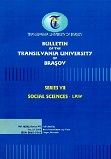John Dewey and progressivism in American education
John Dewey and progressivism in American education
Author(s): Lucian RaduSubject(s): Psychology
Published by: Editura Universitatii Transilvania din Brasov
Keywords: progressivism; pragmatism; instrumentalism; active school
Summary/Abstract: This paper is focused on Progressivism, as a reaction against the American traditional school in order to accomplish the purpose of connecting education to the realities imposed by the rapid changes of the American society. Progressivism was developed by John Dewey’s pedagogic theory, being based on Pragmatism, a specific American philosophy, and on instrumentalism, one of its variants to which John Dewey conferred its climax. Experience represented the core concept of his philosophy. After revising this philosophical current, the paper will deal with John Dewey’s pedagogic theory insisting on the method of solving problems as a general method of instruction. The importance of the two schools (Dalton Plan and Winnetka), both based on the progressive theory, will be highlighted. Progressivism opened a new era in American Education based on an active education, which took into account the students’ individualities, stimulating teachers’ creativity and focusing on a practice based education.
Journal: Bulletin of the Transilvania University of Braşov, Series VII: Social Sciences and Law
- Issue Year: 2011
- Issue No: 2
- Page Range: 85-90
- Page Count: 6
- Language: English

